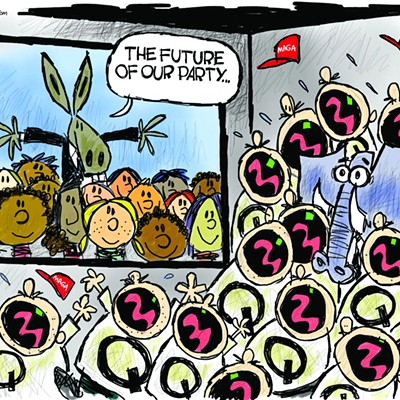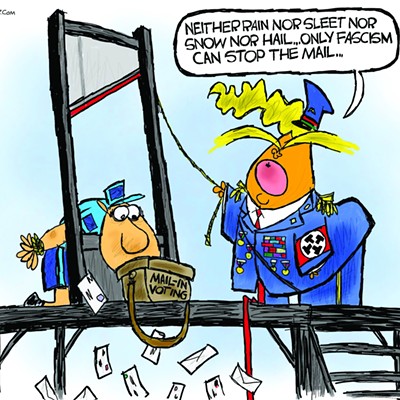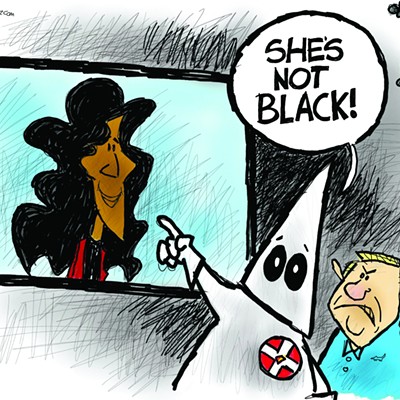"We received hundreds of complaints," recalls Pima County Recorder F. Ann Rodriguez of the electronic and personal telephone bombardment, "and I understand why they're complaining. Some people even wanted to cancel their registration." Some Southern Arizona legislators now want to create a voluntary "do not call" list to protect voters from political phone calls.
One's telephone number, occupation and eight other pieces of information requested on the registration forms are not mandatory. Instead, state law specifically lists only six items that must be provided, including name, address, date of birth and citizenship.
Local privacy rights advocate Willy Bils thinks there are several reasons the voter registration form prepared by the Arizona secretary of state's office doesn't point out that most of the questions don't have to be answered.
"The state knew people would object to providing any more than the minimum information," Bils believes.
From Bils' perspective, the form's questions are, in part, politically motivated. "This way," he says, "politicians running for office don't have to spend money to buy the information from a private party." Instead, Bils observes, they can obtain this valuable data directly from their political party, which gets it from the county recorder's office.
Bils observes that because the voter registration form identifies only one "optional" item--an Indian census or tribal number--"It negatively implies that every other item is mandatory, and we know they're not."
Bils sees serious implications in gathering all this non-mandatory information. "We're providing a (personal) dossier for any government that wants to use it," he warns.
"The notion of the government using semantic tricks which lead a reasonable person to believe all the items (are mandatory) is an act of cynicism that's completely antithetical to the cleanliness we want in our electoral process," Bils says, adding, "If we saw businesses doing this, we'd consider it fraud."
Kevin Tyne, spokesman for Arizona Secretary of State Jan Brewer, disagrees. He emphasizes that state law requires all the questions to be asked, if not answered, and only provides for the one "optional" designation.
Acknowledging a person can register to vote by simply supplying the mandatory six items of information, Tyne says the other questions are asked on the voter registration form to "help the county recorders know if a person is on the voting roles twice."
Elaborating on that view, Rodriguez says at least some of the non-mandatory information helps her office match names during verification of petition signatures. "There are a lot of common names," the recorder says, "especially as Tucson gets bigger and bigger."
As an example, she says there are 44 Michael Browns registered to vote, some with identical middle names. Rodriguez admits that a telephone number isn't useful in these cases, but that it is sometimes used to contact early voters.
As a short-term solution to nagging political phone calls, Rodriguez tells people they can call her office (740-4350) and ask to have their telephone number put on a list for "internal" use only. As a longer-term possibility, she supports changing the voter registration form to indicate that providing the phone number and other items is optional.
"Let people filling out the form make that decision," Rodriguez says. "I think (the form) should inform them of what's optional or what's mandatory."
Tyne and Rodriguez agree this change would require action by the state legislature. Southern Arizona Republican representative Marian McClure says she'd be willing to sponsor such a bill.
"I recommend people not put their phone numbers down on the form," McClure says, "because I know it's optional. ... As far as I'm concerned, I wouldn't mind if it wasn't on the form."
While admitting she used electronic phone calls in last year's primary race to combat her opponent's negative campaign, McClure also says, "If F. Anne Rodriguez comes to me to make (some things on the form) optional, I would do it next year."
Rodriguez indicates any proposed changes would have to be made cooperatively between all the county recorders and the secretary of state's office, but promised to bring the issue up at a recent recorders meeting.
If a bill is introduced in the legislature to indicate that the telephone number and other items are optional, Bils says he'd tell lawmakers, "The less information the better. If those who run for office on miniscule amounts of money are inconvenienced, so be it."
Bils believes the voter registration form should list the statute numbers that identify which items are mandatory and which are not, and should clearly distinguish the optional items.
"If a person wants to trust the government (by providing all the information), that person is free to be as foolish as he wants to be," Bils says. "But to have the government obtain the data through trickery is an outrage."












